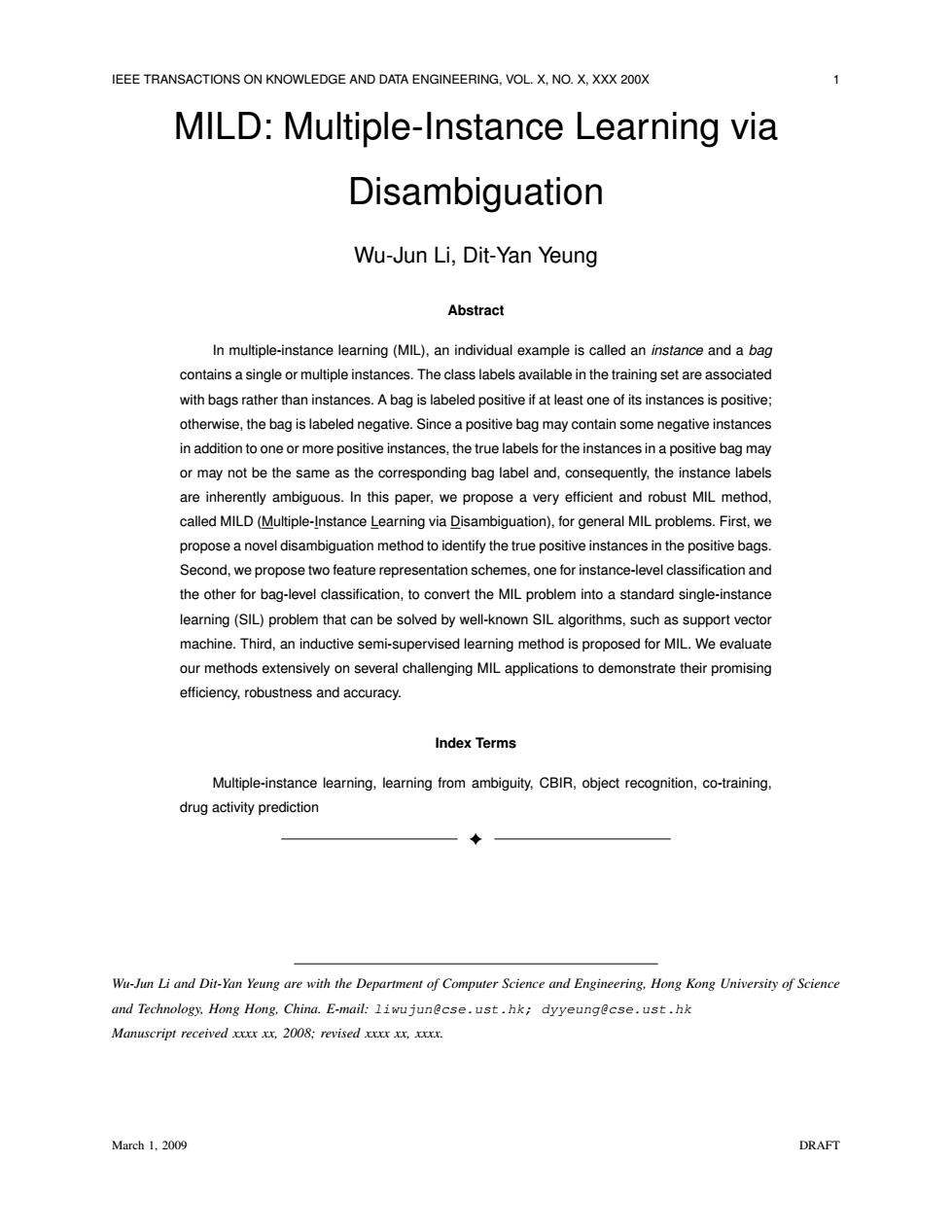正在加载图片...

IEEE TRANSACTIONS ON KNOWLEDGE AND DATA ENGINEERING,VOL.X,NO.X,XXX 200X MILD:Multiple-Instance Learning via Disambiguation Wu-Jun Li,Dit-Yan Yeung Abstract In multiple-instance learning(MIL),an individual example is called an instance and a bag contains a single or multiple instances.The class labels available in the training set are associated with bags rather than instances.A bag is labeled positive if at least one of its instances is positive; otherwise,the bag is labeled negative.Since a positive bag may contain some negative instances in addition to one or more positive instances,the true labels for the instances in a positive bag may or may not be the same as the corresponding bag label and,consequently,the instance labels are inherently ambiguous.In this paper,we propose a very efficient and robust MIL method, called MILD(Multiple-Instance Learning via Disambiguation),for general MIL problems.First,we propose a novel disambiguation method to identify the true positive instances in the positive bags. Second,we propose two feature representation schemes,one for instance-level classification and the other for bag-level classification,to convert the MIL problem into a standard single-instance learning(SIL)problem that can be solved by well-known SIL algorithms,such as support vector machine.Third,an inductive semi-supervised learning method is proposed for MIL.We evaluate our methods extensively on several challenging MIL applications to demonstrate their promising efficiency,robustness and accuracy. Index Terms Multiple-instance learning,learning from ambiguity,CBIR,object recognition,co-training, drug activity prediction Wu-Jun Li and Dit-Yan Yeung are with the Department of Computer Science and Engineering,Hong Kong University of Science and Technology.Hong Hong,China.E-mail:liwujunecse.ust.hk;dyyeungecse.ust.hk Manuscript received xxxx xx,2008;revised xxxx xx,xxxx. March 1,2009 DRAFTIEEE TRANSACTIONS ON KNOWLEDGE AND DATA ENGINEERING, VOL. X, NO. X, XXX 200X 1 MILD: Multiple-Instance Learning via Disambiguation Wu-Jun Li, Dit-Yan Yeung Abstract In multiple-instance learning (MIL), an individual example is called an instance and a bag contains a single or multiple instances. The class labels available in the training set are associated with bags rather than instances. A bag is labeled positive if at least one of its instances is positive; otherwise, the bag is labeled negative. Since a positive bag may contain some negative instances in addition to one or more positive instances, the true labels for the instances in a positive bag may or may not be the same as the corresponding bag label and, consequently, the instance labels are inherently ambiguous. In this paper, we propose a very efficient and robust MIL method, called MILD (Multiple-Instance Learning via Disambiguation), for general MIL problems. First, we propose a novel disambiguation method to identify the true positive instances in the positive bags. Second, we propose two feature representation schemes, one for instance-level classification and the other for bag-level classification, to convert the MIL problem into a standard single-instance learning (SIL) problem that can be solved by well-known SIL algorithms, such as support vector machine. Third, an inductive semi-supervised learning method is proposed for MIL. We evaluate our methods extensively on several challenging MIL applications to demonstrate their promising efficiency, robustness and accuracy. Index Terms Multiple-instance learning, learning from ambiguity, CBIR, object recognition, co-training, drug activity prediction ✦ Wu-Jun Li and Dit-Yan Yeung are with the Department of Computer Science and Engineering, Hong Kong University of Science and Technology, Hong Hong, China. E-mail: liwujun@cse.ust.hk; dyyeung@cse.ust.hk Manuscript received xxxx xx, 2008; revised xxxx xx, xxxx. March 1, 2009 DRAFT